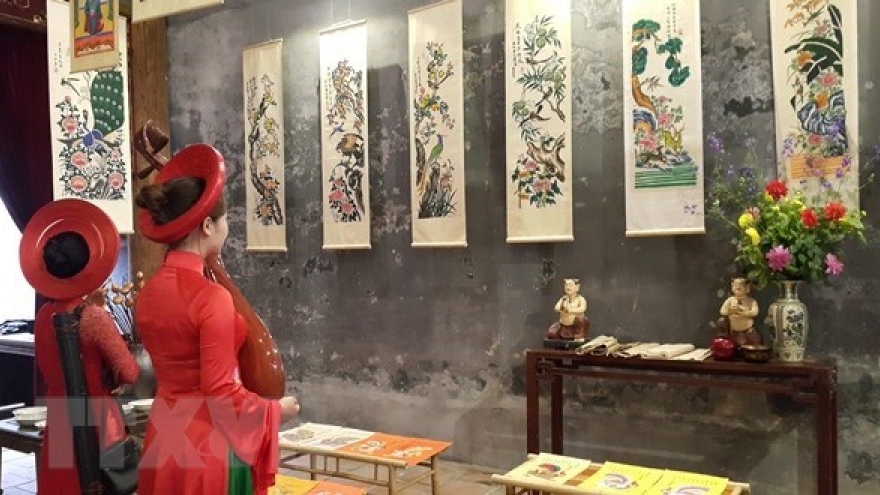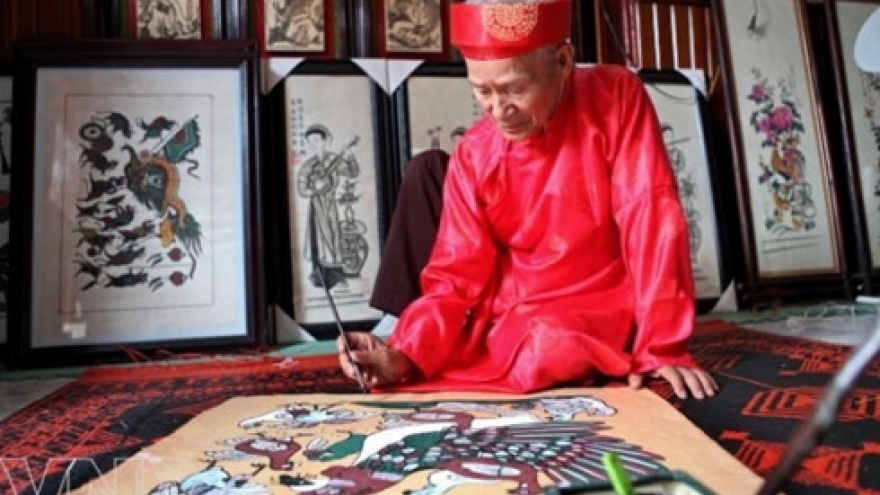Vietnamese folk paintings displayed in Thang Long Citadel
Thursday, 18:46, 30/08/2018
Some 50 folk paintings of Vietnam are being introduced at an exhibition which opened at the Thang Long Imperial Citadel, Hanoi on August 29.
Organised by the Thang Long-Hanoi Heritage Conservation Centre and the centre of the Ecole Francaise d'Extreme-Orient (French School of the Far East – EFEO) in Ho Chi Minh City, the exhibition introduces paintings featuring diverse topics, from daily life, religious practices, literature, and seasons, and historical stories.
Notably, it also presents research results into folk art through meticulously describing the process of making paintings and analysing the paintings’ themes in their specific cultural and historical context.
The paintings displayed at the event were selected from the book “Vietnamese folk paintings - collection and research” by Maurice Durand, which was published by EFEO publishing house.
The book introduces a large part of the collection of more than 400 folk paintings collected by Durand in Hanoi from 1940 in Hanoi with the support of scholars Tran Van Giap, Tran Huy Ba, Louis Bezacier and Paul Lesvy.
Tran Viet Anh, Director of the Thang Long-Hanoi Heritage Conservation Centre, said folk paintings are precious cultural heritage that should be respected and preserved.
These paintings were copied with high quality from the originals, which are being preserved at the EFEO.
Born in 1914 in Hanoi, Maurice Durand was the son of a French sinologist and a Vietnamese woman. He was a historian, literary language expert and critic, and art analyst as well and died in 1966.
Maurice Durand is one of the rare bilingual researchers of the EFEO, with knowledge of French and Vietnamese cultural sources which are closely related to Han scripts.
The exhibition "Vietnamese folk painting" is open from August 29 to September 30.
The same day, an exhibition on documents, photos, and paintings relating to the former Governors of Hanoi - Nguyen Tri Phuong and Hoang Dieu who fought to protect the capital during the semi-feudal colonial time, was opened at Cua Bac Gate relic site.
More than 60 exhibits at the event highlight the role of the two famous generals who commanded the army and civilians in fighting against French colonialists in Hanoi in the 1800s.
 |
|
Visitors at the exhibition (Source: VNA)
|
The paintings displayed at the event were selected from the book “Vietnamese folk paintings - collection and research” by Maurice Durand, which was published by EFEO publishing house.
The book introduces a large part of the collection of more than 400 folk paintings collected by Durand in Hanoi from 1940 in Hanoi with the support of scholars Tran Van Giap, Tran Huy Ba, Louis Bezacier and Paul Lesvy.
Tran Viet Anh, Director of the Thang Long-Hanoi Heritage Conservation Centre, said folk paintings are precious cultural heritage that should be respected and preserved.
These paintings were copied with high quality from the originals, which are being preserved at the EFEO.
Born in 1914 in Hanoi, Maurice Durand was the son of a French sinologist and a Vietnamese woman. He was a historian, literary language expert and critic, and art analyst as well and died in 1966.
Maurice Durand is one of the rare bilingual researchers of the EFEO, with knowledge of French and Vietnamese cultural sources which are closely related to Han scripts.
The exhibition "Vietnamese folk painting" is open from August 29 to September 30.
The same day, an exhibition on documents, photos, and paintings relating to the former Governors of Hanoi - Nguyen Tri Phuong and Hoang Dieu who fought to protect the capital during the semi-feudal colonial time, was opened at Cua Bac Gate relic site.
More than 60 exhibits at the event highlight the role of the two famous generals who commanded the army and civilians in fighting against French colonialists in Hanoi in the 1800s.


